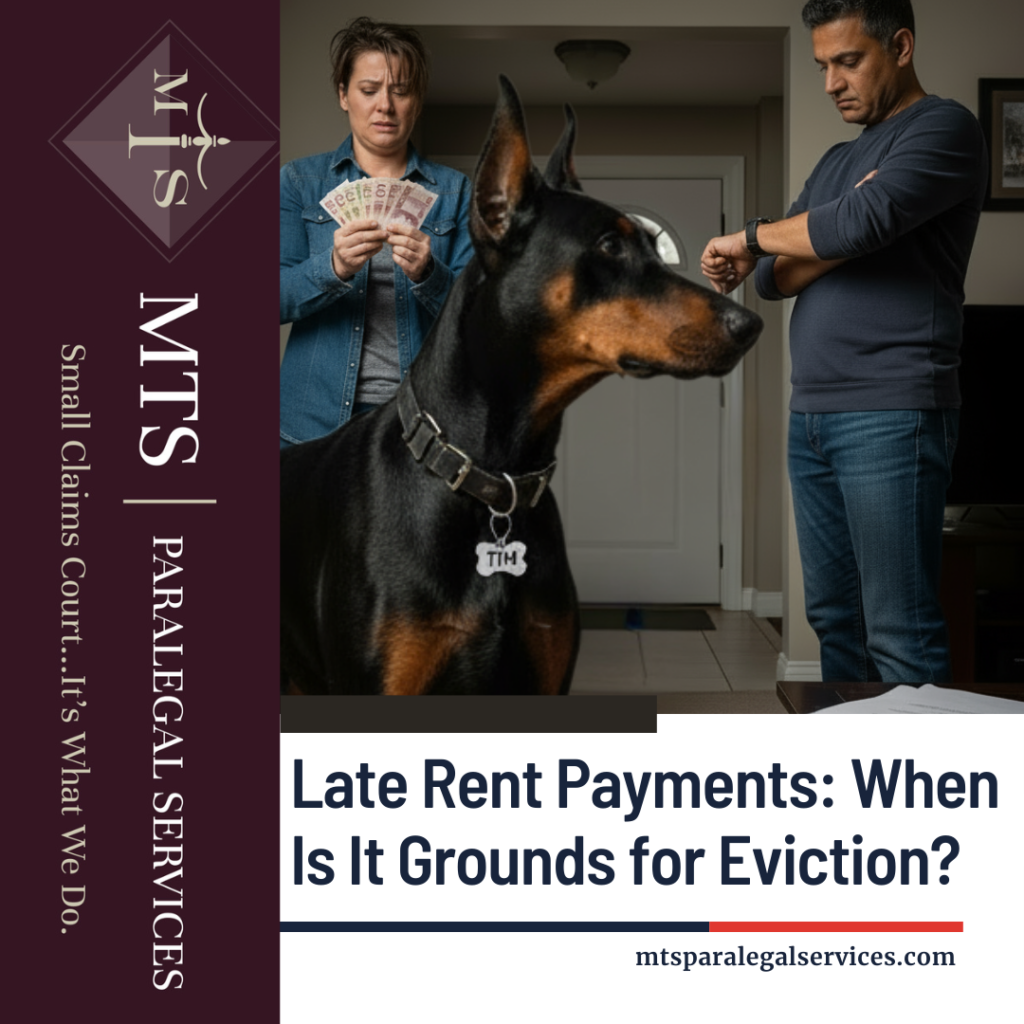
Understanding Late Rent Eviction in Ontario
In Ontario, rent is due on the exact date specified in the lease agreement, most often the first of the month. When a tenant misses this deadline, the rent is immediately considered late, which is a breach of the Residential Tenancies Act, 2006 (RTA).
While a single late payment is technically a breach, it rarely results in eviction on its own. However, consistent late payments or ongoing unpaid arrears can lead to formal action through the Landlord and Tenant Board (LTB). Landlords must follow specific steps carefully, as even small mistakes can delay or completely derail the process.
Step 1: Form N4 – Non-Payment of Rent
The first step in addressing unpaid rent is serving Form N4 – Notice to End a Tenancy Early for Non-Payment of Rent. This notice gives the tenant a final opportunity to pay what they owe or move out.
- Timeline:
- 14 days’ notice for monthly or yearly tenancies.
- 7 days’ notice for daily or weekly tenancies.
- 14 days’ notice for monthly or yearly tenancies.
- If the tenant pays the full amount by the termination date, the N4 notice becomes void, and the tenancy continues.
- Partial payments do not automatically void the notice unless both parties agree in writing.
If the tenant does not pay in full by the deadline, the landlord can file Form L1 – Application to Evict a Tenant for Non-Payment of Rent and to Collect Rent the Tenant Owes with the LTB. This application begins the legal eviction process.
Step 2: Persistent Late Payments – Form N8
Sometimes, tenants eventually pay their rent, but they do so late every month. This can create ongoing challenges for landlords who need timely payments to cover mortgage, utilities, and other expenses.
For these situations, landlords can serve Form N8 – Notice to End a Tenancy at the End of the Term for Persistent Late Payment of Rent. This form addresses a pattern of late payments rather than a single missed payment.
Key requirements for Form N8:
- 60 days’ notice for monthly or yearly tenancies, ending on the last day of the rental period.
- 28 days’ notice for daily or weekly tenancies.
- The notice must clearly list specific dates when rent was due and when it was actually paid to show a consistent pattern of lateness.
- After issuing an N8, the landlord files Form L2 – Application to End a Tenancy and Evict a Tenant if the tenant does not correct the behaviour.
LTB Hearing Process
Once the L1 or L2 application is filed, the LTB schedules a hearing. Both the landlord and tenant can present evidence.
The landlord must prove:
- The notice was served properly and on time.
- The arrears exist or there is a documented pattern of late payments.
- All forms were completed accurately.
The tenant may defend themselves by showing:
- Improper notice or incorrect service.
- Unaddressed repair or maintenance issues.
- Proof of harassment or bad faith by the landlord.
Even if the landlord proves their case, the LTB has discretion. Instead of eviction, the Board may order a repayment plan or other resolution if it considers it fair and reasonable.
Collecting Rent Arrears After the Tenant Moves Out
If the tenant has already left the unit but still owes rent or caused damages, the landlord cannot pursue the matter through the LTB. Instead, they must take action through Ontario Small Claims Court.
- New jurisdiction limit: Effective October 1, 2025, landlords can claim up to $50,000 for unpaid rent and damages.
- This expanded limit offers more options for landlords dealing with rent arrears in Ontario, especially in situations involving large amounts or significant property damage.
Why Legal Accuracy Matters
The late rent eviction process in Ontario is highly technical. Common mistakes include:
- Incorrectly calculating notice periods.
- Failing to serve forms properly.
- Accepting partial rent after issuing an N4 without a written agreement, which can reset the process.
Because of these complexities, many landlords choose to work with a licensed paralegal. Proper legal representation ensures the process runs smoothly and reduces the risk of dismissal at the LTB.
Get Help With Late Rent Eviction Ontario
If you are dealing with persistent arrears, habitual late payments, or a complex eviction situation, MTS Paralegal Services can help.
Located at 15 Schneider Ave, Unit A2, Kitchener, MTS provides skilled representation before the Landlord and Tenant Board and Ontario Small Claims Court.
📞 Call Tim at (226) 444-4882 to take decisive, legally compliant action to protect your property and recover unpaid rent.
This content does not constitute legal advice. For up-to-date guidance or legal advice specific to your situation, please contact MTS Paralegal Services Professional Corporation or call (226) 444-4882.
